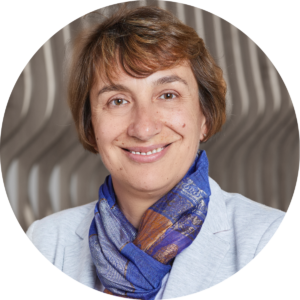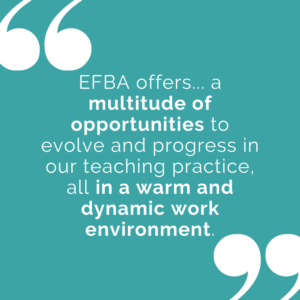
Nadia grew up in Vaucluse in the south of France. After her family’s succession of international moves, she settled down in the Bay Area in 2007, and decided to explore the world of education to share her passion for the French language and to help French-language families preserve their roots. She joined EFBA as a teacher in 2015. Since 2017, she has been leading the FLAM (French Language as Mother Tongue) textbook project, developed under the Creative Commons license. Nadia is also a DELF/DALF administrator.
Introduce yourself: Where are you from? What are your origins? Your educational background? What did you study?
I am from Pertuis in Vaucluse, France. I am married and have two children, Fanny (22) and Victor (18). I graduated with a master’s degree in computer science applied to business management in Aix-en-Provence. After a few years working in Paris in computer service companies, we moved to Singapore and Sydney for my husband’s work. Then we went back to Paris and I worked for the Ministry of the Interior where I was in charge of the Elections application. After a few years in the Paris region, we moved to San Francisco Bay Area, where we have been living since 2007. I then decided to convert to education and I obtained the Certificate to teach French as a foreign language. I also passed the qualification to be an DELF / DALF Examiner. I am also very proud to be in charge of the Virgule notebooks collection, a teaching tool for our extracurricular program for French classes.
Apart from French or English, do you know other languages? If yes, could you say something in that language?
Unfortunately no! But I do understand the Provençal dialect.
What is EFBA for you? Why did you choose EFBA over other organizations?
If I had to present EFBA to parents, I would say that EFBA is a non-profit that works to maintain the teaching of French in the vast region of San Francisco by offering a complete program in immersion for all French or multicultural families who wish to preserve their mother tongue and their Francophone culture. On the other hand, if I had to introduce EFBA to teachers, I would say that EFBA offers a local extracurricular program, within a structured pedagogical framework, with a multitude of opportunities to evolve and progress in our teaching practice, all in a warm and dynamic work environment.

Why did you want to become a teacher and what does teaching mean for you?
I became a teacher at EFBA because it corresponds to my professional expectations and my personal aspirations. I prefer the term teacher to professor, because we teach a lot of things to EFBA.
I like to convey and guide students to become happy bilinguals. Teaching is a challenge that fascinates me: how can I transfer knowledge to students? I used to tell them that if they did not understand, it’s because I mis-explained. I like to question myself constantly. At the end of each class, I take 10 minutes of my time (often in my car on my way home) to ask myself the following question: “What could I have done better?” This analysis allows me to self-evaluate and try to do better next time!
Do you think learning a new language is beneficial and why?
Children who speak several languages have undeniable advantages over others. They have a better ability to concentrate and multitask; they are more open to others and have a better understanding of the world in which they live; they show more empathy; and finally they have more confidence in themselves. I would have liked to speak several languages.
How do you teach French to your students?
I use the method of the collection Virgule to build my courses so that they are interesting and adapted to the best level of the children. I try this so that my courses are not too academic, and more playful and dynamic. Although I prepare them in advance, I am always very attentive to adapt them to the students depending on their ability to listen and concentrate, which is very variable from one day to another.
How do you keep your students’ interest alive?
I work by positive reinforcement to enhance what students do in French. I also use various media portals such as books, videos, songs, TV news, and weather forecasts, so that the courses are not monotonous. We also play different games in French that are adapted to lessons. Finally, I remind them regularly that we are in French class. So you have to speak in French only to be able to progress; the idea is to be able to communicate with cousins, grandparents, friends… all the people close to the students who speak only French.
What is one of the best memories or experiences you had with your students or while teaching? 
This question is very easy: this acrostic done by a student!
If you were a quote or a word then what would it be?
“The whole is more than the sum of its parts.”
Tell us a fun fact about you (personality, likes or dislikes).
I’m the queen of pancakes and gratins and I’m the coordinator of the Club Femmes Ici et Ailleurs in the San Francisco Bay Area.
Interview by Eva Gimello – Outreach and Development Associate
Stay connected with us!
Follow us on | Facebook | Instagram | #efbaschool


